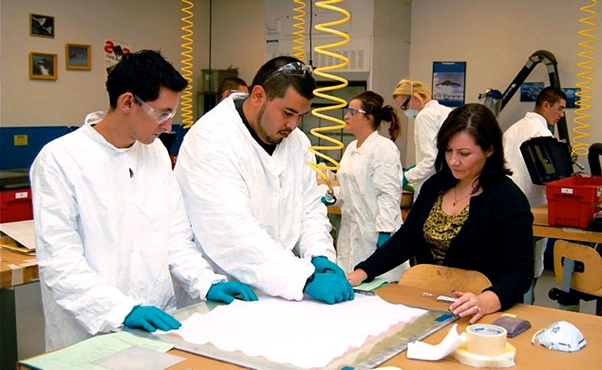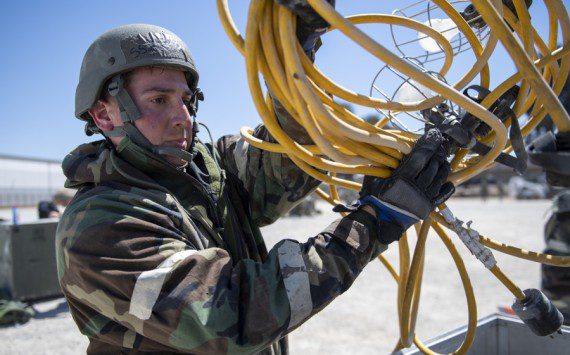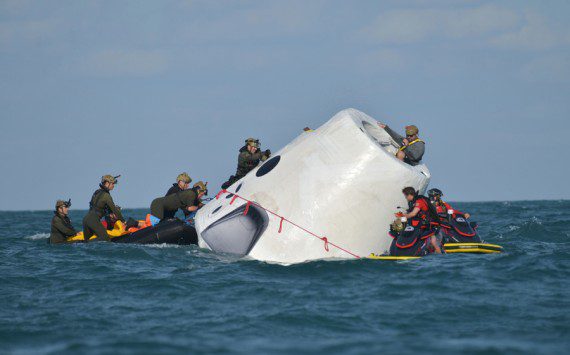Antelope Valley College expanded both the depth and the reach of its aeronautics education programs in 2016.
Ranging from rapid training to new bachelor’s program, AVC is on track to become a world-class leader in aeronautic technical training programs.
This fall, 18 students made history as the first cohort in the new Airframe Manufacturing Technology bachelor’s degree program. This one-of-a-kind program was specifically designed to meet aerospace industry needs for individuals who serve as first-line leads in the major processes of aircraft manufacturing, with a focus on manufacturing and industrial engineering. As previous graduates of the AVC Aircraft Fabrication & Assembly, and Airframe & Powerplant programs, students started the program with junior standing. They are likely to be some of California’s first community college bachelor’s degree graduates.
Applications are accepted during the spring terms for each cohort of 25 students. An additional track is also being developed for new freshman students without any aerospace experience. Students new to the Antelope Valley are encouraged to consider application to the program.
“We are very interested in veterans and people working at Edwards,” said Dr. Maria Clinton, Department Chair of Industrial Technology and Aeronautics Professor. “We accept work and military experience for entrance into the programs; it is not just about the transcript.”
In addition to the new bachelor’s program, the college continues to offer certificates and associate degrees for students specializing in aircraft fabrication, electronics technology and an airframe and powerplant maintenance technician program certified by the Federal Aviation Administration. The college also offers a lower division engineering program that coordinates with an engineering degree offered locally through California State University, Long Beach.
In addition to these long-standing programs, AVC has addressed a specific industry need with rapid training programs. Partnered with City of Palmdale and South Valley WorkSource Center, AVC offers aircraft fabrication courses to prescreened students in 8-week blocks. In addition to coursework, students participate in resume workshops and mock interviews. There is also drug testing and Department of Justice screening before they are qualified to work in aerospace positions. With a job placement rate for the first cohort of more than 90 percent, demand in the program is high. The current interest list is over 800 names long with South Valley WorkSource Center.
The background of students in the courses is varied, including some students who just graduated from high school, to mature adults looking for a second career, to several formerly homeless people who are using this opportunity to get back on track. A number have no experience in the manufacturing industry, yet their aptitude, adaptability, and willingness to learn are more important, says Joel Morgan, WorkSource Coordinator.
Local aerospace employers maintain a strong partnership with AVC aeronautic programs, providing input on curriculum development and industry needs. New to AVC for 2017, the college will be offering a class in pneumatic systems, specifically designed with input from local employers.
“Local aerospace employers have a critical need for a skilled workforce. AVC is committed to helping our students achieve their goals, allowing them to remain in the valley with high paying jobs,” says Dr. Bonnie Suderman, AVC’s Vice President of Academic Affairs.
Regional aerospace organizations that regularly employ AVC graduates include Northrop Grumman, Lockheed Martin, Scaled Composites, General Atomics, The Spaceship Company and general aviation companies. Many local aerospace employees also build relationships with the college by serving on the aeronautics advisory board or working as part-time program faculty.
AVC program reach is spreading beyond the Antelope Valley; Hawthorn, Calif.,-based Space X has recently taken an interest in AVC’s aeronautics program after hiring a recent graduate.
“They were blown away by all that we teach our students,” says Clinton. “Next year, our faculty will be visiting their facilities to see how we can better meet their needs. And in return, I want someone from the company to serve on my advisory committee – that’s how AVC develops partnerships.”












